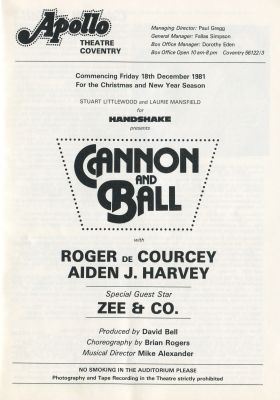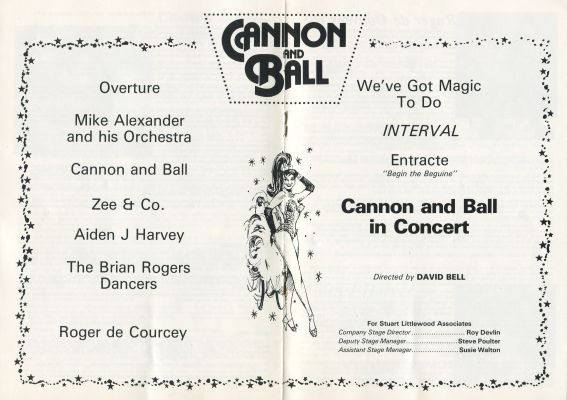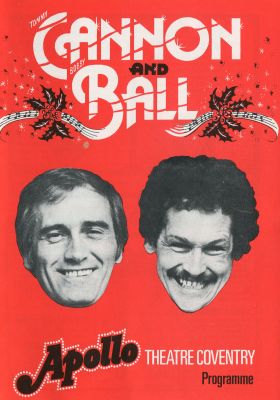
Dates
Ran from Friday 18th December 1981 “For the Christmas Season”.
Running Order
|
|
Overture Interval Entracte: “Begin the Beguine” |
Programme Notes
Cannon and Ball
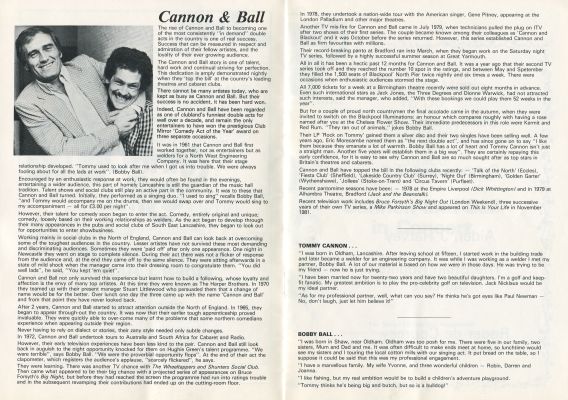 The rise of Cannon and Ball to becoming one of the most consistently “in demand” double acts in the country is one of real success. Success that can be measured in respect and admiration of their fellow artistes, and the loyalty of their ever growing audience.
The rise of Cannon and Ball to becoming one of the most consistently “in demand” double acts in the country is one of real success. Success that can be measured in respect and admiration of their fellow artistes, and the loyalty of their ever growing audience.
The Cannon and Ball story is one of talent, hard work and continual striving for perfection. This dedication is amply demonstrated nightly when they ‘top the bill’ at the country’s leading theatres and cabaret clubs. There cannot be many artistes today, who are kept as busy as Cannon and Ball. But their success is no accident, it has been hard won.
Indeed, Cannon and Ball have been regarded as one of clubland’s funniest double acts for well over a decade, and remain the only entertainers to have won the prestigious Club Mirror ‘Comedy Act of the Year’ award on three separate occasions.
It was in 1961 that Cannon and Ball first worked together, not as entertainers but as welders for a North West Engineering Company. It was here that their stage
relationship developed. “Tommy used to look after me when I got us into trouble. We were always fooling about for all the lads at work”. (Bobby Ball).
Encouraged by an enthusiastic response at work, they would often be found in the evenings, entertaining a wider audience, this part of homely Lancashire is still the guardian of the music hall tradition. Talent shows and social clubs still play an active part in the community. It was to these that Cannon and Ball turned. Initially, they performed as a singing duo. “I used to sing” recalls Bobby Ball, “and Tommy would accompany me on the drums, then we would swap over and Tommy would sing to my accompaniment – all for £3.00 per night”.
However, their talent for comedy soon began to enter the act. Comedy, entirely original and unique; comedy, loosely based on their working relationships as welders. As the act began to develop through their many appearances in the pubs and social clubs of South East Lancashire, they began to look out for opportunities to enter showbusiness.
Working mainly in social clubs in the North of England, Cannon and Ball can look back at overcoming some of the toughest audiences in the country. Lesser artistes have not survived these most demanding and discriminating audiences. Sometimes they were ‘paid off after only one appearance. One night in Newcastle they went on stage to complete silence. During their act there was not a flicker of response from the audience and, at the end they came off to the same silence. They were sitting afterwards in a state of mild shock when the manager came into their dressing room to congratulate them. “You did well lads”, he said, “You kept ’em quiet”.
Cannon and Ball not only survived this experience but learnt how to build a following, whose loyalty and affection is the envy of many top artistes. At this time they were known as The Harper Brothers. In 1970 they teamed up with their present manager Stuart Littlewood who persuaded them that a change of name would be for the better. Over lunch one day the three came up with the name ‘Cannon and Ball’ and from that point they have never looked back.
After 2 years, Cannon and Ball started to attract attention outside the North of England. In 1965, they began to appear throughout the country. It was now that their earlier tough apprenticeship proved invaluable. They were quickly able to over-come many of the problems that some northern comedians experience when appearing outside their region.
Never having to rely on dialect or stories, their zany style needed only subtle changes.
In 1972, Cannon and Ball undertook tours to Australia and South Africa for Cabaret and Radio.
However, their early television experiences have been less kind to the pair. Cannon and Ball still look back in auguish to the night opportunity knocked for them on Hughie Green’s talent programme. “We were terrible”, says Bobby Ball. “We were the proverbial opportunity flops”. At the end of their act the clapometer, which registers the audience’s applause, “scarcely flickered”, he says.
They were learning. There was another TV chance with The Wheeltappers and Shunters Social Club.
Then came what appeared to be their big chance with a projected series of appearances on Bruce Forsyth’s Big Night, but before they had reached the screen the programme had run into ratings trouble and in the subsequent revamping their contributions had ended up on the cutting-room floor.
In 1978, they undertook a nation-wide tour with the American singer, Gene Pitney, appearing at the London Palladium and other major theatres.
Another TV mis-fire for Cannon and Ball came in July 1979, when technicians pulled the plug on ITV after two shows of their first series. The couple became known among their colleagues as ‘Cannon and Blackout’ and it was October before the series returned. However, this series established Cannon and Ball as firm favourites with millions.
Their record-breaking panto at Bradford ran into March, when they began work on the Saturday night TV series, followed by a highly successful summer season at Great Yarmouth.
All in all it has been a hectic past 12 months for Cannon and Ball. It was a year ago that their second TV series took off and they reached the number 10 spot in the ratings, and between May and Spetember they filled the 1,500 seats of Blackpool’ North Pier twice nightly and six times a week. There were occasions when enthusiastic audiences stormed the stage.
All 7,000 tickets for a week at a Birmingham theatre recently were sold out eight months in advance. Even such international stars as Jack Jones, the Three Degrees and Dionne Warwick, had not attracted such interests, said the manager, who added, “With these bookings we could play them 52 weeks in the year”.
But for a couple of proud north countrymen the final accolade came in the autumn, when they were invited to switch on the Blackpool Illuminations: an honour which compares roughly with having a rose named after you at the Chelsea Flower Show. Their immediate predecessors in this role were Kermit and Red Rum. “They ran out of animals,” jokes Bobby Ball.
Their LP ‘Rock on Tommy’ gained them a silver disc and their two singles have been selling well. A few years ago, Eric Morecambe named them as “the next double act”, and has since gone on to say “I like them because they emanate a lot of warmth. Bobby Ball has a lot of heart and Tommy Cannon isn’t just a straight man. Another five years will establish them in a big way”. They are certainly repaying this early confidence, for it is easy to see why Cannon and Ball are so much sought after as top stars in Britain’s theatres and cabarets.
Cannon and Ball have topped the bill in the following clubs recently: – Talk of the North’ (Eccles), ‘Fiesta Club’ (Sheffield), ‘Lakeside Country Club’ (Surrey), ‘Night Out’ (Birmingham), ‘Golden Garter’ (Wythenshawe), ‘Jollees’ (Stoke-on-Trent) and ‘Circus Tavern’ (Purfleet).
Recent pantomime seasons have been: – 1978 at the Empire Liverpool (Dick Whittington) and in 1979 at Alhambra Theatre, Bradford (Jack and the Beanstalk).
Recent television work includes Bruce Forsyth’s Big Night Out (London Weekend), three successive years of their own TV series, a Mike Parkinson Show and appeared on This Is Your Life in November 1981.
TOMMY CANNON . . .
“I was born in Oldham, Lancashire. After leaving school at fifteen, I started work in the building trade and later became a welder for an engineering company. It was while I was working as a welder I met my partner, Bobby Ball. A lot of our material is based on how we were in those days. He was trying to be my friend – now he is just trying.
“I have been married now for twenty-two years and have two beautiful daughters. I’m a golf and keep-fit fanatic. My greatest ambition is to play the pro-celebrity golf on television. Jack Nicklaus would be my ideal partner.
“As for my professional partner, well, what can you say? He thinks he’s got eyes like Paul Newman – No, don’t laugh, just let him believe it!”
BOBBY BALL . . .
“I was born in Shaw, near Oldham. Oldham was too posh for me. There were five in our family, two sisters, Mum and Dad and me. It was often difficult to make ends meet at home, so lunchtime would see my sisters and I touring the local cotton mills with our singing act. It put bread on the table, so I suppose it could be said that this was my professional engagement.
“I have a marvellous family. My wife Yvonne, and three wonderful children – Robin, Darren and
Joanna.
“I like fishing, but my real ambition would be to build a children’s adventure playground.
“Tommy thinks he’s being big and butch, but so is a bulldog!”
Roger de Courcey
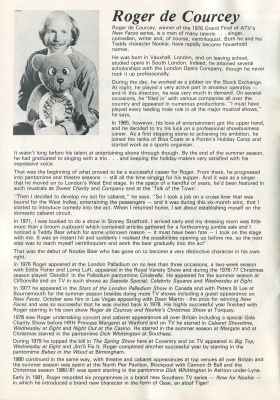
Roger de Courcey, winner of the 1976 Grand Final of ATV’s New Faces series, is a man of many talents . . . singer, comedian, writer and, of course, ventriloquist. Both he and his Teddy character Nookie, have rapidly become household names.
He was born in Vauxhall, London, and on leaving school, studied opera in South London. Indeed, he attained several scholarships with the London Opera Company, though he never took it up professionally.
During the day, he worked as a jobber on the Stock Exchange. At night, he played a very active part in amateur operatics – and in this direction, he was very much in demand. On several occasions, he ‘filled in’ with various companies all over the country and appeared in numerous productions. “I must have played every leading male role in all the major musical shows,” he says.
In 1965, however, his love of entertainment got the upper hand, and he decided to try his luck on a professional showbusiness career. As a first stepping stone to achieving his ambition, he joined the ranks of Blue Coats at a Pontin’s Holiday Camp and started work as a sports organiser.
It wasn’t long before his talent at entertaining shone through though. By the end of the summer season, he had graduated to singing with a trio . . . and keeping the holiday-makers very satisfied with his expressive voice.
That was the beginning of what proved to be a successful cateer for Roger. From there, he progressed into pantomime and theatre seasons – still all the time singirjg for his supper. And it was as a singer that he moved on to London’s West End stage. In the space of a handful of years, he’d been featured in such musicals as Sweet Charity and Company and at the Talk of the Town’.
“Then I decided to develop my act for cabaret,” he says. “So I took a job on a cruise liner that was bound for the West Indies, entertaining the passengers – and it was during this six-month stint, that I started to introduce comedy into the act. When I returned home, I set about establishing myself on the domestic cabaret circuit.
In 1971, I was booked to do a show in Stoney Stratford. I arrived early and my dressing room was little more than a broom cupboard which contained articles gathered for a forthcoming jumble sale and I noticed a Teddy Bear which for some unknown reason – it must have been fate – I took on the stage with me. It was an instant hit and suddenly I realised the possibilities opening up before me, so the next step was to teach myself ventriloquism and work the bear gradually into the act”.
That was the debut of Nookie Bear who has gone on to become a very distinctive character in his own right.
In 1976 Roger appeared at the London Palladium on no less than three occasions, a two-week season with Eddie Fisher and Lorna Luft, appeared in the Royal Variety Show and during the 1976/77 Christmas season played ‘Dandini’ in the Palladium pantomime Cinderella. He appeared for the summer season at Cliftonville and on TV in such shows as Seaside Special, Celebrity Squares and Wednesday at Eight.
In 1977 he appeared in the Stars of the London Palladium Show in Canada and with Peters & Lee at Bournemouth for the summer season besides doing more TV shows including a guest appearance on New Faces. October saw him in Las Vegas appearing with Dean Martin – the prize for winning New Faces and was so successful that he was invited back in 1978. His highly successful year finished with Roger starring in his own show Roger de Courcey and Nookie’s Christmas Show at Torquay.
1978 saw Roger undertaking concert and cabaret appearances all over Britain including a special Gala Charity Show before HRH Princess Margaret at Watford and on TV he starred in Cabaret Showtime, Wednesday at Eight and Night Out at the Casino. He starred in the summer season at Margate and at Christmas starred in the pantomime Dick Whittington at Southsea.
During 1979 he topped the bill in The Spring Show here at Coventry and on TV appeared in Big Top, Wednesday at Eight and Jim’ll Fix It. Roger completed another successful year by starring in the pantomime Babes in the Wood at Birmingham.
1980 continued in the same way, with theatre and cabaret appearances at top venues all over Britain and the summer season was spent at the North Pier Pavilion, Blackpool with Cannon & Ball and the Christmas season 1980/81 was spent starring in the pantomime Dick Whittington in Ashton-under-Lyne.
Early in 1981, Roger recorded six programmes in a brand new Southern TV series – Now for Nookie – in which he introduced a brand new character in the form of Osse, an aloof Tiger!
Zee and Co
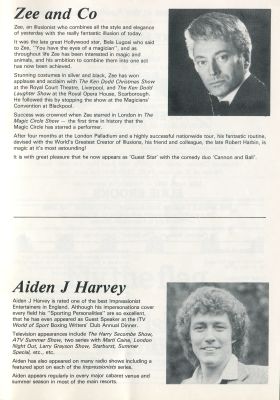
Zee, an illusionist who combines all the style and elegance of yesterday with the really fantastic illusion of today.
It was the late great Hollywood star, Bela Lugosi who said to Zee, “You have the eyes of a magician”, and as throughout life Zee has been interested in magic and animals, and his ambition to combine them into one act has now been achieved.
Stunning costumes in silver and black, Zee has won applause and acclaim with The Ken Dodd Christmas Show at the Royal Court Theatre, Liverpool, and The Ken Dodd Laughter Show at the Royal Opera House, Scarborough. He followed this by stopping the show at the Magicians’ Convention at Blackpool.
Success was crowned when Zee starred in London in The Magic Circle Show – the first time in history that the Magic Circle has starred a performer.
After four months at the London Palladium and a highly successful nationwide tour, his fantastic routine, devised with the World’s Greatest Creator of Illusions, his friend and colleague, the late Robert Harbin, is magic at it’s most astounding!
It is with great pleasure that he now appears as ‘Guest Star’ with the comedy duo ‘Cannon and Ball’.
Aiden J Harvey
Aiden J Harvey is rated one of the best Impressionist Entertainers in England. Although his impersonations cover every field his “Sporting Personalities” are so excellent, that he has even appeared as Guest Speaker at the ITV World of Sport Boxing Writers’ Club Annual Dinner.
Television appearances include The Harry Secombe Show, ATV Summer Show, two series with Marti Caine, London Night Out, Larry Grayson Show, Starburst, Summer Special, etc., etc.
Aiden has also appeared on many radio shows including a featured spot on each of the Impressionists series.
Aiden appears regularly in every major cabaret venue and summer season in most of the main resorts.
